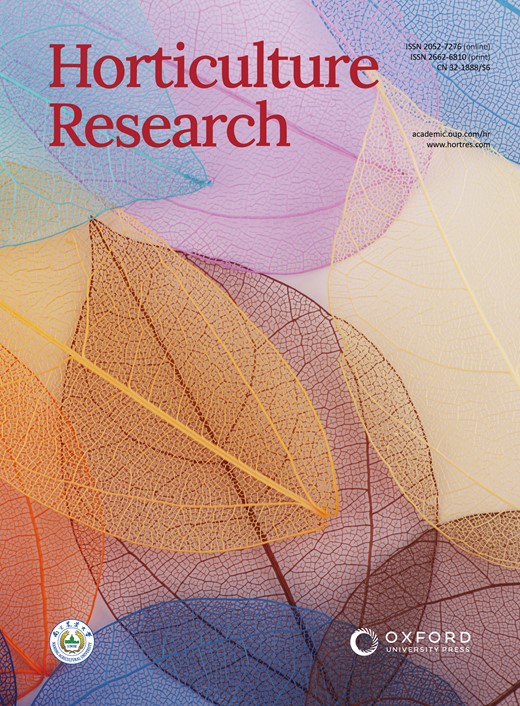CsMYB73 负向调节茶芽中由 CsGGT2 和 CsGGT4 介导的茶氨酸积累
IF 8.5
1区 农林科学
Q1 Agricultural and Biological Sciences
引用次数: 0
摘要
茶氨酸代谢是茶叶种植和生产过程中一个必要的生物过程,它决定着茶叶的品质。目前,人们对茶树茶氨酸代谢的转录调控知之甚少。本研究表明,γ-谷氨酰转肽酶 CsGGT4 作为茶氨酸水解酶 CsGGT2 的同源蛋白,具有更高的茶氨酸合成催化效率。同源建模和分子对接表明,CsGGT2 和 CsGGT4 蛋白结构的不同意味着它们在茶树中具有不同的生物学功能。茶氨酸含量与不同季节茶芽中 CsGGT2、CsGGT4 和转录因子 CsMYB73 的表达量有显著相关性。此外,CsMYB73 被证实是一种细胞核定位的转录因子(TF),直接与 CsGGT2 和 CsGGT4 启动子相互作用,是 CsGGT2 的激活因子和 CsGGT4 的抑制因子。因此,这与茶芽中茶氨酸的积累呈负相关。此外,CsMYB73 的持续增加会显著提高 CsGGT2 的表达,并抑制 CsGGT4 的表达。本研究揭示,在 "黄魁 "叶片的季节性返青过程中,观察到茶氨酸的降解增加,同时抑制了茶氨酸的合成,导致茶氨酸在茶芽中的积累显著下降。这项研究有助于更广泛地理解茶芽中茶氨酸代谢的复杂转录调控层次,为茶园管理和提高茶叶品质提供了新方法。本文章由计算机程序翻译,如有差异,请以英文原文为准。
CsMYB73 negatively regulates theanine accumulation mediated by CsGGT2 and CsGGT4 in tea shoots (Camellia sinensis)
Theanine metabolism is a necessary biological process during the planting and production of tea that determines tea quality. There is currently little knowledge about the transcriptional regulation of theanine metabolism in tea plants. This study, we demonstrated that γ-glutamyl-transpeptidase CsGGT4, as a homologous protein of the theanine hydrolase CsGGT2, exhibited a higher theanine synthesis catalytic efficiency. Homology modeling and molecular docking showed that differential protein structures between CsGGT2 and CsGGT4 implied their different biological functions in tea plants. Theanine content correlated significantly with the expression of CsGGT2, CsGGT4 and the transcription factor CsMYB73 in tea shoots from different seasons. Additionally, CsMYB73 was confirmed to act as a nucleus-localized transcription factor (TF), directly interacts with the CsGGT2 and CsGGT4 promoters, serving as an activator of CsGGT2 and a suppressor of CsGGT4. Consequently, this leads to a negative association with theanine accumulation in tea shoots. Furthermore, the continuous increase in CsMYB73 produced a significantly increase in CsGGT2 expression and inhibited CsGGT4 expression. The present study reveals that the degradation of theanine has been observed to increase, concomitantly with the inhibition of theanine synthesis, resulting in a significant decline in the accumulation of theanine in tea shoots during the process of seasonal greening in 'Huangkui' leaves. This study contributes to the broader comprehension of the intricate transcriptional regulatory hierarchy that governs the metabolism of theanine in tea shoots, offering novel approaches for managing tea plantations and enhancing tea quality.
求助全文
通过发布文献求助,成功后即可免费获取论文全文。
去求助
来源期刊

Horticulture Research
Biochemistry, Genetics and Molecular Biology-Biochemistry
CiteScore
11.20
自引率
6.90%
发文量
367
审稿时长
20 weeks
期刊介绍:
Horticulture Research, an open access journal affiliated with Nanjing Agricultural University, has achieved the prestigious ranking of number one in the Horticulture category of the Journal Citation Reports ™ from Clarivate, 2022. As a leading publication in the field, the journal is dedicated to disseminating original research articles, comprehensive reviews, insightful perspectives, thought-provoking comments, and valuable correspondence articles and letters to the editor. Its scope encompasses all vital aspects of horticultural plants and disciplines, such as biotechnology, breeding, cellular and molecular biology, evolution, genetics, inter-species interactions, physiology, and the origination and domestication of crops.
 求助内容:
求助内容: 应助结果提醒方式:
应助结果提醒方式:


